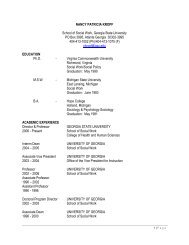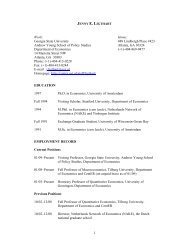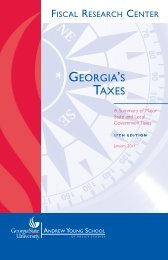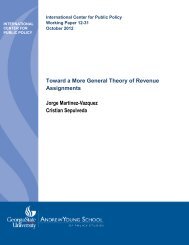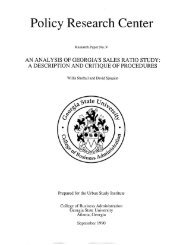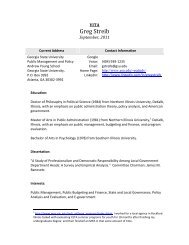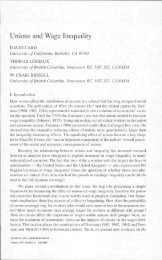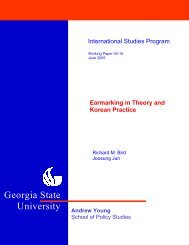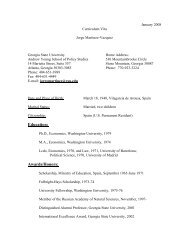Robin Boadway and Frank Flatters - Andrew Young School of Policy ...
Robin Boadway and Frank Flatters - Andrew Young School of Policy ...
Robin Boadway and Frank Flatters - Andrew Young School of Policy ...
Create successful ePaper yourself
Turn your PDF publications into a flip-book with our unique Google optimized e-Paper software.
630 / <strong>Robin</strong> <strong>Boadway</strong> <strong>and</strong> <strong>Frank</strong> <strong>Flatters</strong><br />
over all income groups. Therefore the equalization program that is called for on<br />
efficiency grounds is one that fully equalizes per capita revenues from both<br />
source-based taxes <strong>and</strong> residence-based taxes.<br />
This system <strong>of</strong> equalization has the following characterization. If provinces<br />
behave identically ex post, they will all provide the same level <strong>of</strong> public services at the<br />
same tax rates. Any differences in the ability to provide public services at given tax<br />
rates will be eliminated by the equalization system. Our initial assumption that all<br />
provinces levy the same rate <strong>of</strong> tax in the absence <strong>of</strong> equalization is, in fact,<br />
unnecessary. The formula used in actual equalization schemes uses ex post tax rates<br />
<strong>and</strong> so provincial behaviour in the absence <strong>of</strong> equalization is irrelevant. Of course, if<br />
provinces behave differently ex post, no system <strong>of</strong> equalization can achieve perfect<br />
efficiency. The most that can be achieved is that equalizing both source <strong>and</strong><br />
residence-based tax revenues will give provinces the potential to provide the same<br />
level <strong>of</strong> services at the same tax rates, though not all will conform. Full equalization in<br />
this context would presumably use national average tax rates (like the present<br />
system).<br />
It should be noted, <strong>of</strong> course, that our results on equalization <strong>of</strong> residence-based<br />
taxes are sensitive to the way in which provincial budgets are formulated. We have<br />
used a special case in which provincial redistribution comes about through<br />
proportional residence-based taxation <strong>and</strong> equal per capita benefits, <strong>and</strong> this may not<br />
be far from the truth. It is reasonably straightforward to deduce the sorts <strong>of</strong><br />
equalization schemes that would be called for under different patterns <strong>of</strong> provincial<br />
redistribution, <strong>and</strong> we shall not do so here. Suffice it to say that if provincial<br />
governments are more (less) redistributive than we have assumed, a greater (less)<br />
degree <strong>of</strong> equalization is called for.<br />
CONCLUDING REMARKS<br />
In this paper we have investigated some <strong>of</strong> the efficiency implications <strong>of</strong> models <strong>of</strong><br />
fiscal federalism for the design <strong>of</strong> interprovincial equalization schemes. Several key<br />
points have emerged from the analysis. First, one cannot expect in general that<br />
migration decisions taken by individuals in a decentralized federal economy will lead<br />
to an efficient allocation <strong>of</strong> labour over provinces. Not only can the migration process<br />
be locally inefficient (in the sense <strong>of</strong> not satisfying the first-order social efficiency<br />
conditions), it may well also be globally inefficient. Second, self-interested<br />
provincial governments acting on behalf <strong>of</strong> their residents have an incentive to take<br />
budgetary actions that, from a national point <strong>of</strong> view, lead to inefficiencies <strong>and</strong><br />
inequities. Finally, the federal government faced with the inefficiencies <strong>and</strong><br />
inequities arising out <strong>of</strong> individual <strong>and</strong> provincial government behaviour will be<br />
justified in using a system <strong>of</strong> equalization payments as a policy instrument in the<br />
pursuit <strong>of</strong> nationwide equity <strong>and</strong> efficiency.<br />
The specific form the equalization formula should take will depend upon the<br />
manner in which the economy is presumed to operate. Our analysis was carried out<br />
for a particular set <strong>of</strong> assumptions. Prices were assumed fixed, provinces were



